目錄
Anxiety often manifests as excessive and irrational feelings of fear, worry, or nervousness, along with physical behaviors like restlessness, fidgeting, and pacing. Even without any external triggers, those experiencing anxiety may feel constantly tense, with tight muscles, and show symptoms of an overactive nervous system, such as palpitations, sweating, hand tremors, and frequent urination. Although the exact causes of anxiety are still unclear, it is thought to be influenced by factors like genetics, personality, cognitive processes, challenging life events, and physical health issues.
Five-Element Music and Acupressure: A Calming Approach
So, how can we manage anxiety early and relieve stress? Wu Jiahui suggests a soothing combination of Five-Element music and acupressure, which can help calm the mind and reduce anxiety. However, it’s essential to remember that while these methods from traditional Chinese medicine for anxiety can provide temporary relief, they are not a substitute for medical treatment. Severe anxiety should still be addressed under a doctor’s guidance to avoid delayed care.
Five-Element Music for a Peaceful Mind
In Traditional Chinese Medicine (TCM), anxiety is primarily viewed as a condition linked to liver function, focusing on relieving liver tension and promoting energy flow. Based on the ancient text The Yellow Emperor’s Inner Canon, the Five-Element music therapy pairs the five organs—liver, heart, spleen, lungs, and kidneys—with specific musical tones: Jiao (角), Zhi (徵), Gong (宫), Shang (商), and Yu (羽). Listening to these tones helps calm the mind and manage anxiety, giving individuals a way to address negative emotions before they build up.
Here’s a guide to Five-Element music and the types of music that suit various emotional and physical needs:
Jiao Tone Music – Helps relieve liver tension and ease emotional blockages. Suitable pieces include Da Hu Jia, Spring Moon over the Flower-filled River, A Journey to Gusu, and Dream of the South.
Zhi Tone Music – Stimulates positive energy and mental clarity. Recommended tracks include Birds Worship the Phoenix, Flowers Blooming under a Full Moon, Dance of the Golden Snake, and Purple Bamboo Melody.
Gong Tone Music – Promotes stomach and spleen health for balanced energy. Tracks include Ambush from All Sides, Autumn Moon over the Calm Lake, and Moonlit Night on the Lake.
Shang Tone Music – Moistens the lungs and supports kidney function, enhancing the body’s natural balance. Suggested pieces are White Snow in Spring, High Mountains and Flowing Waters, and Clouds over Xiao and Xiang.
Yu Tone Music – Strengthens the kidneys and soothes liver fire. Try Song of the Border, Three Variations on the Plum Blossom, and The Butterfly Lovers.
Acupressure for Serenity
In addition to music, acupressure is a powerful tool in TCM for balancing the body’s energy and calming the mind. Massaging certain acupoints can help relax the body and reduce anxiety:
Baihui Point: This point helps balance overall energy, bringing tranquility and a calm mind.
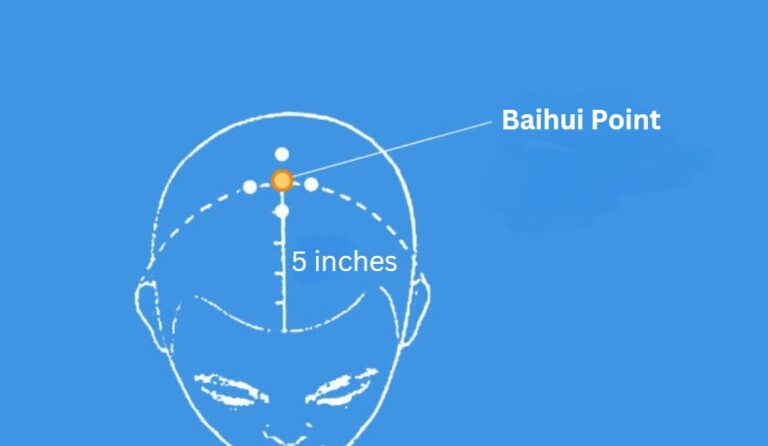
Shenmen and Neiguan Points: These points soothe the mind and relieve discomfort.
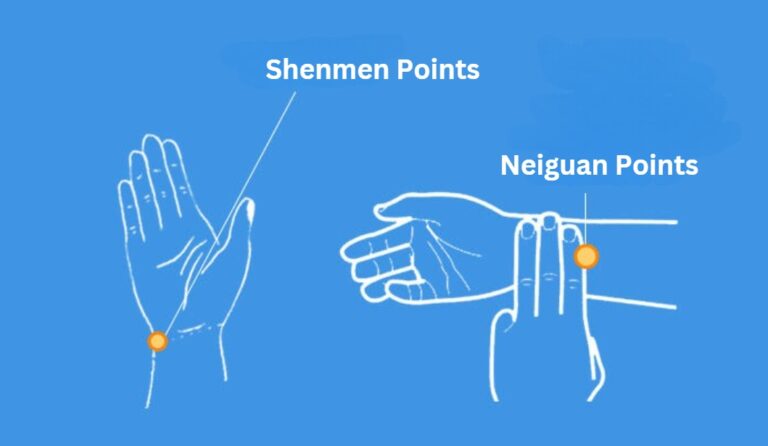
Taichong Point: Massaging here eases emotional tension and supports liver health.
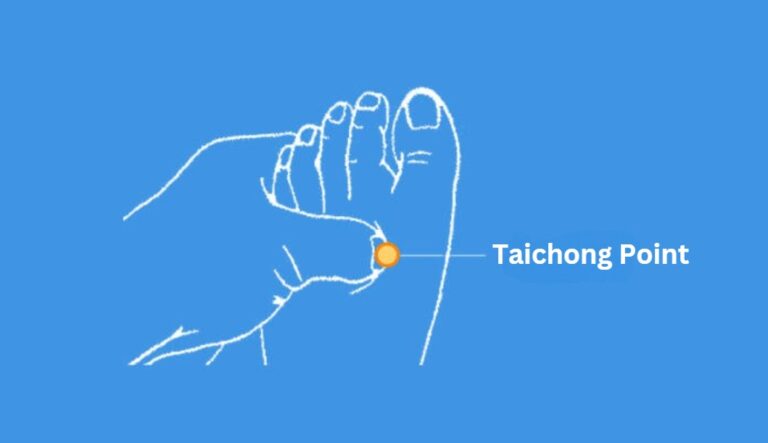
Zusanli and Sanyinjiao Points: Both points help support digestion and blood flow, promoting a peaceful state of mind.
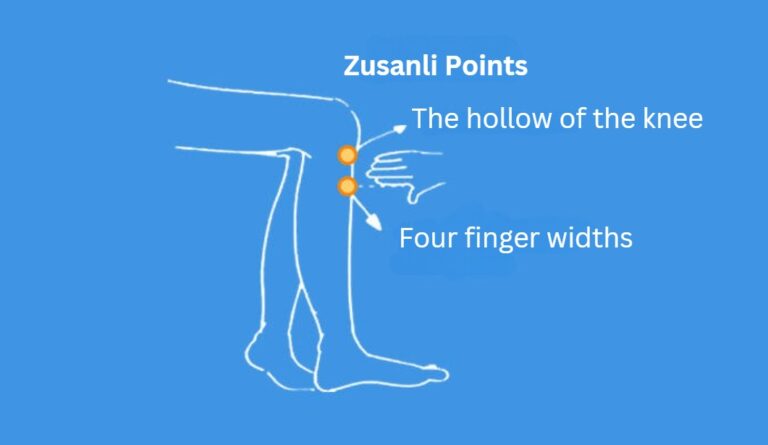
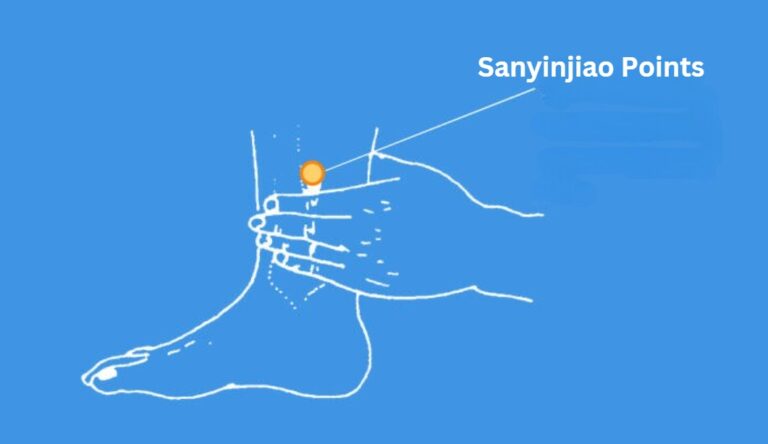
While Five-Element music and acupressure are great natural remedies to relieve temporary tension and anxiety, they should not replace medical treatment. For individuals with severe anxiety, it’s crucial to consult a healthcare professional for medication or other treatments to prevent prolonged distress.
Acupuncture for Anxiety: A Traditional Chinese Medicine Approach
Feeling anxious can be overwhelming, but traditional Chinese medicine offers a unique perspective on managing it through acupuncture. Let’s explore how this ancient practice works and the key concepts behind it.
The Role of Qi and Balance
In traditional Chinese medicine, anxiety often arises when the flow of qi (pronounced “chee”), or life energy, is disrupted. This energy needs to move freely throughout the body to maintain balance between yin and yang, the two opposing forces that keep us grounded. When there’s an imbalance, it can affect the zang organs (like the heart and liver) linked to emotional health, leading to feelings of stress and anxiety.
How Acupuncture Helps
Acupuncture aims to restore balance by targeting specific acupuncture points along the body’s energy pathways, known as meridians. These tiny needles stimulate energy points, helping to redistribute energy and promote homeostasis—a state where your body and mind feel calm and centered.
Research suggests that acupuncture can activate the parasympathetic nervous system, which helps you relax. It also triggers the release of endorphins, the body’s natural “feel-good” chemicals, to ease tension and improve mood.
Key Acupuncture Points for Anxiety
Some commonly used acupuncture points for anxiety include:
- Yintang (the “third eye”) to calm the mind.
- Shenmen (on the ear) to reduce stress.
- Pericardium 6 (on the wrist) for soothing emotional upset.
These points are often paired with techniques like acupressure, which you can even try at home for self-care.
The Seven Emotions and Anxiety
Traditional Chinese medicine links emotions to specific organs, a concept known as the seven emotions. For instance, excessive worry affects the spleen, while fear impacts the kidneys. Acupuncture addresses these emotional imbalances by harmonizing the corresponding zang organs.
Simple Self-Help Tips
Besides acupuncture, here are some self-help recommendations:
- Practice light acupressure on your wrist or between your eyebrows to calm your mind.
- Focus on deep, rhythmic breathing to encourage qi flow.
- Incorporate gentle exercises like tai chi or yoga to maintain energy balance.
Acupuncture isn’t just about needles—it’s a holistic approach that supports your body’s natural ability to heal. By balancing qi, promoting relaxation, and addressing the root causes of anxiety, it offers a time-tested solution for finding calm and clarity.
Would you try acupuncture to manage anxiety? Share your thoughts!
Chinese Herbs for Anxiety: A Natural Remedy
If you’re looking for a natural way to manage anxiety, Chinese herbs might just be the solution. Traditional Chinese medicine offers a variety of herbal remedies that aim to calm the mind, balance emotions, and restore harmony in the body. Let’s dive into some commonly used herbs and formulas for anxiety relief.
Key Herbs for Easing Anxiety
He Huan Hua (Albizia Flower)
Known as the “flower of happiness,” this herb is great for lifting the mood and calming the mind. It’s often used for emotional distress, restlessness, and insomnia.He Huan Pi (Albizia Bark)
Similar to its flower counterpart, this bark is used to soothe irritability and promote relaxation, especially when anxiety feels overwhelming.Suan Zao Ren (Sour Jujube Seed)
A go-to for calming the mind and improving sleep, this herb is excellent for people who experience anxiety alongside restlessness or insomnia.Long Gu (Dragon Bone) and Mu Li (Oyster Shell)
These two are often paired to ground the mind and ease feelings of tension or panic. They’re especially helpful for severe anxiety or feelings of unease.Yuan Zhi (Polygala Root)
This herb supports mental clarity and emotional balance, making it a great choice for reducing stress and improving focus.
Popular Herbal Formulas for Anxiety
Xiao Yao San (Free and Easy Wanderer)
This classic formula helps harmonize the liver, which is often linked to emotional imbalances like frustration or worry. Variations like Xiao Yao Wan (the pill form) are widely used for stress and mild anxiety.Jia Wei Xiao Yao San (Augmented Free and Easy Wanderer)
An upgraded version of Xiao Yao San, this formula is ideal for people experiencing anxiety along with heat symptoms like irritability or restlessness.Chai Hu Shu Gan San (Bupleurum Powder to Spread the Liver)
This formula targets emotional stress that feels stuck, like when you can’t let go of worries or frustrations.Gan Mai Da Zao Wan
Known as the “harmony pill,” this formula is excellent for calming emotions and treating symptoms of anxiety tied to sadness or nervousness.Gan Cao (Licorice Root)
Often added to herbal formulas, Gan Cao helps harmonize the ingredients and has a gentle calming effect on its own.
Why Choose Chinese Herbs for Anxiety?
Chinese herbs don’t just treat symptoms—they aim to address the root causes of anxiety by restoring balance to your body and emotions. Whether it’s through individual herbs like suan zao ren or formulas like xiao yao san, these remedies can be tailored to fit your specific needs.
A Holistic Approach
For the best results, combine herbal remedies with lifestyle adjustments, like practicing mindfulness, maintaining a balanced diet, and incorporating gentle exercises like tai chi. These complementary practices can help amplify the effects of the herbs and improve overall well-being.
Have you tried Chinese herbs for anxiety? Let us know what worked for you!
Chinese Medicine Therapies for Anxiety: Holistic Healing
Anxiety can feel like a constant weight on your chest, but Chinese medicine offers a range of therapies to help you feel lighter and more balanced. From acupuncture to herbal remedies, these therapies aim to address the root cause of anxiety by restoring harmony to the body and mind.
Understanding Anxiety in Chinese Medicine
In Chinese medicine, anxiety is often linked to imbalances in the zang organs, particularly the heart zang and liver zang. Here are some common patterns associated with anxiety:
- Heart Fire Pattern: When excess heat rises in the heart, it can cause restlessness, irritability, and even insomnia.
- Heart Yin or Blood Deficiency Pattern: A lack of nourishing yin or blood can lead to palpitations, anxiety, and a sense of unease.
- Heart-Spleen Disharmony: When the spleen fails to support the heart, symptoms like worry, fatigue, and overthinking can emerge.
- Kidney Yin Deficiency: A deficiency in kidney yin can disrupt the balance of emotions, causing fear and anxiety.
Key Therapies for Anxiety
Acupuncture
Acupuncture is a cornerstone of Chinese medicine. By targeting specific points along the body’s meridians, it helps rebalance energy flow and calm the mind. It’s particularly effective for patterns like heart fire or kidney yin deficiency.Acupressure
Similar to acupuncture but needle-free, acupressure involves applying gentle pressure to specific points. For instance, pressing the Yintang point (between the eyebrows) can help soothe stress and ease anxiety.Chinese Herbal Medicine
Herbal formulas are customized to address individual patterns. For example:- Gan Mai Da Zao Wan: Used for emotional distress tied to sadness and anxiety.
- Herbs like He Huan Hua (Albizia Flower) and Suan Zao Ren (Sour Jujube Seed) can nourish the heart and calm the spirit.
Tong Ren Therapy
This modern approach combines principles of acupuncture with energy healing. Practitioners use a small hammer to tap specific points on a figurine, promoting energy flow and emotional relief.Lifestyle Adjustments
Traditional Chinese medicine emphasizes a holistic lifestyle. Practices like tai chi, qi gong, and mindfulness can complement treatments and support the healing process.
Emotional Causes of Anxiety: Shan You Si
Chinese medicine often links emotions to specific organs. For example, shan you si (worry and overthinking) is connected to the spleen. Therapies target not just physical symptoms but also emotional triggers, promoting overall well-being.
A Personalized Approach
Every person’s anxiety is unique, and Chinese medicine tailors treatments to suit your specific needs. By focusing on imbalances like heart-spleen disharmony or liver zang stagnation, these therapies offer a deeply personalized path to healing.
Have you explored Chinese medicine for anxiety? Whether you’re curious about acupuncture, herbs, or tong ren therapy, there’s a world of holistic care waiting for you!
Comparing Western and Chinese Medicine Approaches to Anxiety and Depression
When it comes to managing anxiety and depression, both Western and Chinese medicine offer valuable perspectives. While Western medicine often focuses on chemical imbalances and symptom relief, Chinese medicine takes a holistic view, addressing the root causes of emotional distress. Here’s how the two approaches differ and where they overlap.
Western Medicine: Targeting Neurochemistry
In Western medicine, anxiety and depression are often treated as mental health conditions caused by imbalances in brain chemistry. Common treatments include:
- Selective Serotonin Reuptake Inhibitors (SSRIs): Medications that help increase serotonin levels to improve mood.
- Psychotherapy: Talk therapies like cognitive-behavioral therapy to address negative thought patterns.
- Mindfulness Techniques: Practices like meditation and deep breathing to manage stress.
While these approaches are effective for many, some individuals experience treatment-resistant depression, requiring alternative methods or combined therapies.
Chinese Medicine: Restoring Balance and Harmony
Traditional Chinese medicine sees anxiety and depression as imbalances in the body’s energy flow, particularly related to the zang organs (like the liver and heart). Treatments aim to harmonize qi and restore emotional balance:
- Gan (Liver) Qi Stagnation: Often linked to depression, this imbalance is treated with herbs like chaihu and formulas like Xiao Yao San or Jia Wei Xiao Yao San.
- Shen (Spirit): Anxiety and depression are seen as disturbances to the shen, which resides in the heart. Calming the shen is a key focus in treatment.
- Banxia Houpu Decoction: This formula is used to alleviate emotional distress tied to a sensation of heaviness or tightness in the chest.
Comparing Treatment Approaches
| Aspect | Western Medicine | Chinese Medicine |
|---|---|---|
| Focus | Symptom relief, brain chemistry regulation | Holistic balance of body, mind, and spirit |
| Diagnosis | Based on tools like the Hamilton Depression Rating Scale | Based on energy imbalances like Gan Qi Stagnation or shen disturbances |
| Treatment Methods | SSRIs, psychotherapy, mindfulness techniques | Acupuncture, herbal formulas, lifestyle adjustments |
| Personalization | Standardized treatments based on symptoms | Highly individualized based on root causes |
Integration: The Best of Both Worlds
For many people, a combination of Western and Chinese approaches provides the most comprehensive care. For example:
- Using SSRIs to stabilize severe depression while also taking Xiao Yao San to address underlying emotional imbalances.
- Combining mindfulness techniques with acupuncture to enhance relaxation and improve emotional resilience.
Final Thoughts
Western medicine excels in fast-acting solutions and standardized care, while Chinese medicine offers a personalized and holistic approach. Understanding these differences can help you choose the path—or combination of paths—that works best for your emotional well-being.
Which approach resonates with you? Share your thoughts below!
Dietary Adjustments for Anxiety Management
What you eat can have a big impact on how you feel, both physically and emotionally. In traditional Chinese medicine, dietary changes are often recommended to help manage anxiety by supporting your body’s balance and calming the mind. Let’s look at some tips and foods that can make a difference.
Balance Your Energy with Nutrient-Rich Foods
Rehmannia Root
This traditional Chinese herb is believed to nourish the kidneys and support overall vitality. It’s especially helpful if anxiety is tied to adrenal exhaustion or a feeling of constant fatigue.Jujube Date
These small, sweet fruits are great for calming the mind and nourishing the blood. They’re often used in Chinese medicine to reduce tension and promote better sleep.Duanwood Reishi
Known as the “mushroom of immortality,” reishi is believed to support the nervous system and help reduce anxiety by promoting relaxation.Polyrachis Ant
While it might sound unusual, this nutrient-rich ingredient is packed with B vitamins, which are essential for maintaining a healthy nervous system and managing stress.
Keep Your Blood Sugar Stable
Unstable blood sugar levels can make anxiety worse, so it’s important to focus on foods that keep your energy steady:
- Choose low glycemic foods, like whole grains, legumes, and vegetables, to avoid blood sugar fluctuations.
- Avoid refined sugars, which can cause spikes and crashes that may heighten feelings of anxiety.
Reduce Stress-Inducing Foods
Some foods and drinks can exacerbate anxiety, so it’s best to limit or avoid them:
- Caffeine: While it might give you a temporary energy boost, it can overstimulate your nervous system and worsen anxiety.
- Refined Sugars: These can lead to inflammation and energy crashes, contributing to emotional instability.
- Foods that promote toxic heat: Spicy or greasy foods may increase feelings of restlessness and irritability, according to traditional Chinese medicine.
Support Your Nervous System
Incorporating foods rich in B vitamins—like leafy greens, eggs, and nuts—can help strengthen your nervous system and improve your ability to handle stress.
A Holistic View on Diet
Traditional Chinese medicine emphasizes eating in harmony with your body’s needs. Anxiety isn’t just about what you eat but also how you eat. Eating slowly, mindfully, and at regular intervals can support digestion and emotional balance.
Start Small
Dietary changes don’t have to be overwhelming. Begin by adding one or two calming foods, like jujube dates or low glycemic options, and see how they impact your mood. Over time, these small adjustments can contribute to big improvements in managing anxiety.
Have you tried any of these foods or practices to manage anxiety? Let us know how they worked for you!
How Long Does It Take for Traditional Chinese Medicine to Work for Anxiety?
When trying out traditional Chinese medicine (TCM) for anxiety, one common question is, “How long will it take to feel better?” The answer depends on the individual, the severity of symptoms, and the treatment approach, but let’s break it down based on research and experience.
Typical Timeline for Results
Initial Improvements (1–2 Weeks)
For some, subtle changes like better relaxation or improved quality of sleep can appear within the first couple of weeks. This is especially true when taking calming herbal formulas like Jia Wei Xiao Yao San.Notable Progress (4–6 Weeks)
Consistent use of TCM therapies, such as acupuncture or herbal medicine, often leads to noticeable reductions in anxiety symptoms. If combined with lifestyle changes, results may be even more pronounced by this point.Significant Results (8 Weeks)
Studies, including multicenter trials, suggest that herbal formulas like Jia Wei Xiao Yao San can show measurable improvements on tools like the Hamilton Depression Rating Scale (HAMD) or the Clinical Global Impression Scale after about 8 weeks. This timeline aligns with how long it may take conventional medications, such as sertraline, to show full effectiveness.
What to Expect
- Mild-to-Moderate Depression and Anxiety: TCM is particularly effective for managing mild-to-moderate symptoms, with fewer reported adverse events compared to some Western medications.
- Chronic Anxiety: For more persistent cases, results may take longer, and a combination of therapies might be needed.
Comparing TCM with Western Approaches
Western options like sertraline are often faster-acting, but they may come with side effects. TCM takes a gentler, whole-body approach, aiming to address the root cause of anxiety rather than just masking symptoms.
Working with a Primary Care Provider
If you’re already on medication, it’s important to consult your primary care provider before starting TCM. A combined approach may work best, but professional guidance is essential to avoid potential interactions.
Patience and Commitment Are Key
Traditional Chinese medicine isn’t an overnight solution—it’s about gradual healing and balance. Sticking with your treatment plan for at least 8 weeks can give your body the time it needs to adjust and respond.
Are you considering TCM for anxiety? Remember, consistency and communication with your healthcare provider are crucial for success!
Home Tips for Anxiety Relief: Traditional Chinese Medicine Insights
Managing anxiety at home can be simple and effective when you incorporate techniques inspired by traditional Chinese medicine (TCM). These tips focus on calming the mind, improving energy flow, and creating balance in your daily routine.
1. Breathe Your Way to Calm
Breathing techniques are a quick way to ease anxiety. One of the most effective methods is equal breathing, where you inhale and exhale for the same count (e.g., 4 seconds each). This promotes relaxation and helps the body release endorphins, which naturally boost your mood.
2. Mindfulness and Meditation
Apps like Calm and Headspace offer guided meditations that are easy to follow and tailored to reduce anxiety. Try a short session of mindfulness meditation each day to help center your thoughts and manage stress.
3. Soothe Your Senses
- Essential oils: Scents like lavender, chamomile, or sandalwood can help calm your mind. Use them in a diffuser, or add a few drops to a warm bath.
- Herbal tea: Sip on calming teas like chamomile, jujube, or reishi mushroom. These herbs are often recommended in TCM for their soothing properties.
4. Move Your Body
Gentle physical activity can release tension and promote relaxation:
- Yoga poses: Simple postures like Child’s Pose or Forward Fold help stretch the body and calm the mind.
- Stretching: Incorporate light stretches, focusing on areas where you hold tension, like your shoulders and neck.
5. Try Progressive Muscle Relaxation
This technique involves tensing and then releasing each muscle group in your body, starting from your toes and working up to your head. It’s a great way to release built-up tension and quiet an overactive mind.
6. Create a Daily Ritual
Set aside time each day for a calming activity, like brewing herbal tea or practicing yoga. Having a routine can help you feel grounded and in control.
Bonus Tip: Combine Techniques for Greater Effect
Pairing practices—like sipping herbal tea while listening to a guided meditation on the Calm app—can enhance their calming effects.
These TCM-inspired tips are easy to implement and can make a big difference in managing anxiety from the comfort of your home. Which one will you try first? Let us know!
